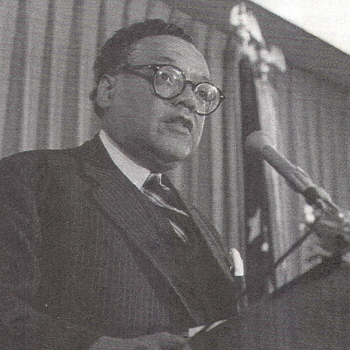William Thaddeus Coleman, Jr., a prominent Republican lawyer and businessman, served as Secretary of Transportation under President Gerald Ford. Born on July 7, 1920 to a middle class Philadelphia, Pennsylvania family, Coleman attended a segregated elementary school. When he moved to Germantown High School he confronted racism as one of only seven blacks in the school. Teachers thought his good grades would lead to a career as a chauffeur. Coleman had other plans; he wanted to be a lawyer.
Coleman, an undergraduate member of Phi Beta Kappa, graduated summa cum laude from the University of Pennsylvania in 1941. He then entered Harvard Law School, but left after a year to join the United States Army Air Corps. After World War II, Coleman returned to law school, and became the first African American to serve on the Harvard Law Review. He graduated magna cum laude in 1946. Initially no large law firms would hire Coleman because he was black, so he landed his first job as a United States appellate court law clerk. In 1948 William T. Coleman became the U.S. Supreme Court’s first black law clerk. He married Lovida Hardin in 1945.
After clerking for the Supreme Court, in 1949 Coleman joined the first of what would be a series of high profile law firms. While working in New York, he met Thurgood Marshall. Over the next few years the two worked together arguing a series of cases to lay groundwork for an assault on school segregation. Coleman coauthored the National Association for the Advancement of Colored People’s (NAACP) brief for Brown v. Board of Education and accompanied Marshall to oral arguments at the Supreme Court in 1954. Coleman remained active in civil rights throughout his career. He argued McLaughlin v. Florida (overturning prohibitions on interracial cohabitation) in 1964 and Bob Jones University v. U.S. (upholding the government’s power to revoke the tax-exempt status of discriminatory religious institutions) in 1983.
Coleman became a presidential adviser in 1959 when he accepted President Dwight Eisenhower’s invitation to serve on the President’s Commission on Employment Policy. He later served on the Warren Commission which investigated the assassination of President John F. Kennedy. He declined President Lyndon Johnson’s offer of an appellate judgeship, and became instead a U.S. delegate to the United Nations. In 1975 Coleman accepted his first full-time Federal appointment, becoming only the second African American cabinet member, as Ford’s Secretary of Transportation. Coleman ran the fourth largest Federal department. True to Republican principles, he attempted to cut federal subsidies to transportation, and promoted government deregulation.
After leaving the cabinet, Coleman ran the Washington, D.C. office of the Los Angeles, California law firm O’Melveny and Meyers. He continued to serve on the boards of major companies, including IBM, Chase Manhattan, and Washington Mutual. Although a life-long Republican, Coleman publicly differed with the Reagan administration over its approach to civil rights. In 1995 President Bill Clinton awarded William T. Coleman the Presidential Medal of Freedom, the highest honor the U.S. government gives to civilians.
William Thaddeus Coleman, Jr., a member of Alpha Phi Alpha Fraternity, died at his home in Alexandria, Virginia on March 31, 2017. He was 96.

